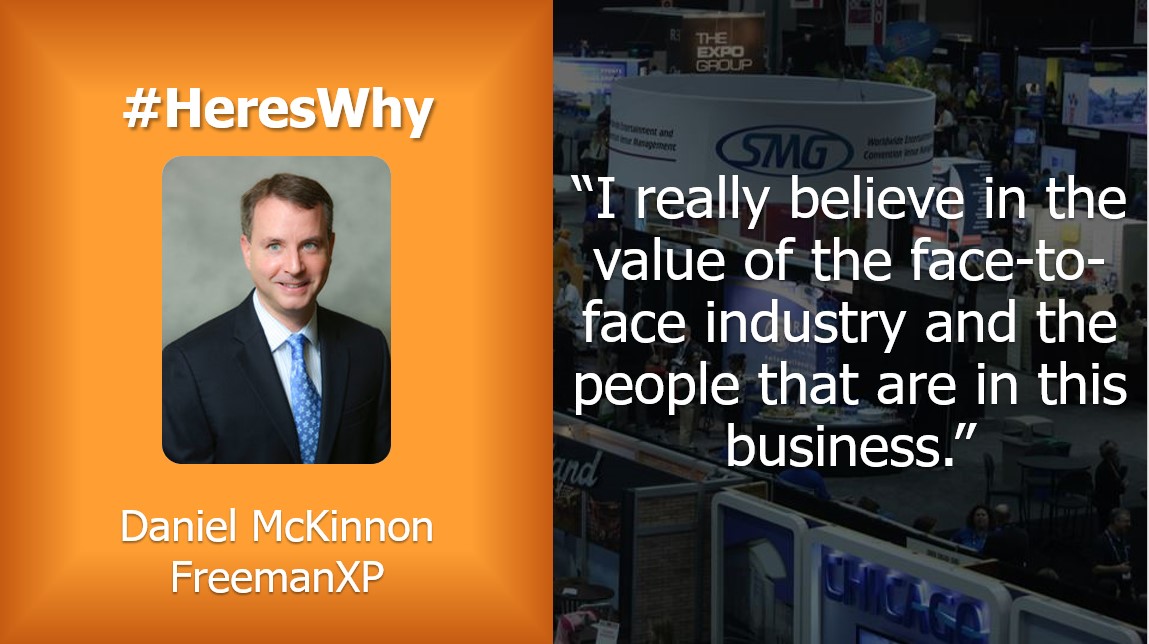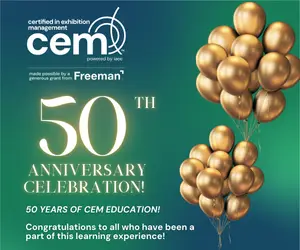
In our next installment of our #HeresWhy industry Q&A sessions, we interviewed Daniel McKinnon, Vice President of Client Solutions at FreemanXP:
Tell us about your career in the tradeshow industry. How did you get to where you are?
When I was in college, I had no idea what the exhibitions and events business was. I knew about hospitality and understood the value of hotels and restaurants, but I was never involved with those businesses growing up. My first job was a legislative assistant to Senator Sam Nunn (D-GA) while I was in graduate school. I really loved it and enjoyed working closely to a seat of power, because the work was very interesting and compelling. However, I learned early on that government just wasn’t for me.
My introduction to the exhibitions industry came from a friend who was looking for a sales person to sell trade show booths for the National Home Healthcare Expo, now Medtrade. As a 22-year-old, I was very interested in the opportunity because it was everything a young adult wanted – more money, more travel, eating at fun restaurants and meeting interesting people. I landed the job with SEMCO and haven’t left the industry since. From the humble beginning of selling 10×10 and 10×20 booths, I worked up to the position of Director of International Sales and Marketing, where I collaborated closely with the Department of Commerce and was very involved with growing the international exhibitor and sponsor revenue. I was actually one of the first people to apply and be granted International Buyer Program certification.
After working at SEMCO for five years, I was interested in doing more. One of my managers had moved to the Atlanta Market Center, and they had an opening for Executive Director of International Development, which was very similar to my other role. I got the job and transitioned over during the Atlanta Olympics in 1996, which was exciting because the offices were downtown and very involved with the events. While there, I worked with Messe Frankfurt, the global events firm, and that opened the door to even more opportunity. After about a year, I had the fantastic opportunity to join Messe Frankfurt.
I ended up working at Messe Frankfurt for over 15 years, making my way up from International Sales and Marketing Manager to Manager to Group Show Director to Vice President to Executive Vice President. It was such a great experience and really secured my career in this industry, because the work was so interesting and compelling that I knew I never wanted to do anything else. After that period, I worked briefly with 1105 Media, but then transitioned to Access Intelligence, where I had the opportunity to run my own business and office in the energy market. I was there for about two years when the energy market fell out from under us.
The next step in my career resulted from my work with Freeman, a partner I respected tremendously. They offered me a newly created global position, Vice President of Global Client Solutions, to help them grow internationally and align that expansion with the established Freeman culture elements of ethics, quality, discipline and structure. I absolutely love it and have being doing this for over three years.
In terms of associations, I’ve been involved with IAEE for a long time. I’ve been on the board for over five years and have been the secretary treasurer, chair of the education committee, chair of the finance committee, incoming chair and now the Chairperson. I really believe in the value of the face-to-face industry and the people that are in this business, and I get great personal and professional satisfaction out of contributing.
What’s your favorite part of going to work?
That’s a hard question to answer. When I was younger, the travel and social aspect of the job was the best part. I loved going to interesting places and experiencing different cultures. Now with five kids, that lifestyle isn’t as appealing, but I still love meeting new people and understanding different industries. For example, in a few days I’m heading to Barcelona for Mobile World Congress where we’re doing a lot of work, and I love being able to see the activation of amazing experiences through design thinking. This industry isn’t one big happy party though – these are tough jobs with tough work. People and organizations put their trust in us and invest in us, and we have to deliver.
My job satisfaction comes from several things: the projects that I work on and help complete, seeing my clients be successful, and seeing the people I work with take pride in the hard work they put into various projects for months and years. Martin Luther King, Jr. once said “those who are not looking for happiness are the most likely to find it, because those who are searching forget that the surest way to be happy is to seek happiness for others.” This is so true for me – I always get more satisfaction out of giving. I like what I do and the people I work with, and even if I won the lottery, I would still want to do this.
How is the exhibitions and events industry valuable to businesses and the economy?
The economic impact of face-to-face engagement, whether it’s B2B or B2C, is very significant. Tradeshows, events and conferences generate billions of dollars in both our domestic economy and the global economy. However, I’d say it’s hard to truly quantify our value because our impact also trickles down to the ancillary businesses that we touch like hotels, airlines, taxi cabs, restaurants and museums. For example, when I travel I always try to make it a point to visit some kind of cultural establishment, but those places don’t know that I’m a tourist or that I’m there for a show. It’s that kind of thing that generates not only directly related revenue for our industry, but also exponentially increases revenue opportunities for these microeconomies where events are held. I’d bet if you were to ask any big American city what their favorite time of year is, it’s going to be when their big events are in town.
On top of that, we are facilitating the future of the economy and different markets. People come face-to-face to talk about the future, not the past. They come to show new technology and products, and to be educated on new processes and protocols. The industry really is invaluable. Face to face engagement is the most important marketing medium that has ever existed and will ever exist, because people are people and we like to come together, shake hands, look each other in the eye and understand each other before and during a business transaction.
What are some obstacles and challenges the industry is facing?
Competition is always going to be there for our industry. Technology is a big competitor for us, as well as every other channel businesses can use to promote their products and connect with people. Internally, we’re also changing in how we do business with each other – hotels are shifting the way they work with show organizers and show organizers are changing the way the work with their contractors and vendors. To adapt and keep moving along, we have to continue to communicate and be collaborative, as well as keep the industry’s best interest at heart.
Some of the other concerns we have now are more serious, like security. Twenty years ago, our industry wasn’t having to actively think about or develop response plans for active shooter situations, but that’s reality now and part of our jobs. In the face of that type of challenge, I think other concerns get blown out of proportion a bit. We shouldn’t stress too much over irrelevant comments and ideas that won’t affect us. Ultimately, at the end of the day, we’ll find a way to come together and be decent and honest with one another. We shouldn’t be sweating the small stuff.
What role does advocacy play in the success of the industry and what does it mean to you?
Advocacy means something different to everyone. For me, the main objective of advocacy is to educate and inform people. We must make sure government leaders are aware of the industry’s economic significance and how influential we are. In general, we already have a great relationship with our government and they’re very collaborative and understand our value, but sometimes we need to work closer with them on travel policies, taxation policies, labor issues and other issues. It’s also worth saying that we have to work with this administration, as well as local, state and global governments, to make sure we have a safe, secure and accessible opportunity to meet with each other.
Having been a legislative assistant and worked in government, I understand that individual impact can be somewhat limited. But, we must try to do so regardless and be active advocates. With the collaboration IAEE has with other organizations like U.S. Travel, PCMA, SISO, UFI and MPI, we’re able to target the right people and effectively demonstrate the value of our business, talk about how policies that negatively impact our businesses are detrimental to the overall economy and encourage policies that benefit our industry.
What’s the most important lesson you’ve learned in your career so far?
Being honest and candid with your colleagues and customers is absolutely critical. Whether it’s reporting bad news early to your boss or reporting failure and course correction to your customer, honesty is paramount.

